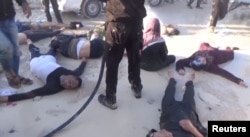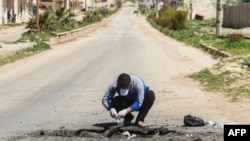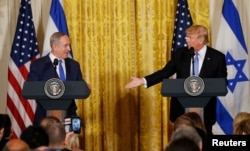U.S. President Donald Trump condemned Syrian President Bashar al-Assad on Wednesday for the deadly chemical weapons attack in Syria, calling it "an affront to humanity," but declining to say what action the United States might take in response.
"You will see. They will have a message, you will see what the message will be," Trump vowed at a White House news conference alongside Jordan's visiting leader, King Abdullah.
Trump described the Tuesday chemical attack in Syria that killed 100 people and left another 350 stricken, including many children, as "horrific," adding, "It's very, very possible that my attitude to Assad has changed very much. These heinous actions by the Assad regime cannot be tolerated."
But Trump, while issuing a stern warning to Assad, said he would not disclose ahead of time how the United States might respond.
"I'm not saying I'm going to do anything, but I'm certainly not going" to announce it in advance, Trump told one reporter, while also assailing U.S. and Iraqi military leaders for announcing months ahead of time of their plans to attack Mosul to try to oust Islamic State fighters from Iraq's second biggest city.
Trump criticized his predecessor, former President Barack Obama, for failing to act in 2012 against the Assad regime after declaring "a red line" necessitating U.S. military action if the Syrian leader used chemical or biological weapons against an array of fighters trying to overthrow his government.
While numerous lawmakers criticized Obama at the time for his inaction, Congress also balked at approving U.S. military intervention. At the time, Trump himself also urged Obama in a series of tweets not to attack Syria.
Under sunny skies in the Rose Garden Wednesday, Trump said Obama "had a great opportunity" to intervene in Syria, and the fact that he did not "set us back a long ways, not only in Syria but in many other parts of the world, because it was a blank threat. I think it was something that was not one of our better days as a country."
But Trump said that, as president, "I now have responsibility, and I will have that responsibility, and carry it very proudly."
For his part, the Jordanian monarch told Trump, "On Syria and the gas attack, unfortunately, as you and I both agree, this is another testament to the failure of the international diplomacy to find solutions to this crisis."
He said the Syrian conflict "has been going on, ongoing for seven years now, has descended into proxy wars from different parties with dubious agendas. But at the end of the day, as you pointed out, Mr. President, it’s the civilians, women and children that are paying the heaviest price.
"This is happening on our watch," King Abdullah said, "on our conscience as well as the global community, and I know the passion and emotion that the president has expressed in how this should not be tolerated whatsoever. And this --- threshold of inhumanity and savagery that are being crossed every day, is something that I know the president will not allow to ... happen wherever it may be, and I fully support and endorse the president in this issue.”
The deadly attack in Syria, on Jordan's doorstep, as well as the possibility of renewed Israeli-Palestinian peace talks, topped the agenda of talks between Trump and King Abdullah.
Jordan's king, acting as something of an envoy from the Arab world, was bringing a message of renewed interest in a peace pact with Israel that would include Arab and Muslim nation recognition of the Jewish state in exchange for creation of a Palestinian state in the West Bank, Gaza and East Jerusalem.
King Abdullah called the decades-long Israeli-Palestinian stalemate "essentially the core conflict in our region." He said Trump's "early engagement ... in bringing the Palestinians and the Israelis together ... a very encouraging sign for all of us."
Arab leaders renewed the offer they first made to Israel in 2002 at a summit meeting last week, but Israel has balked at withdrawing from lands it captured in 1967's Six-Day War.
The new possibility of peace talks and creation of a Palestinian state dovetails with Trump's announced goal of achieving a lasting Mideast accord, something that has eluded U.S. presidents for decades.
Trump has declared himself a staunch friend of Israel and already has met with Israeli Prime Minister Benjamin Netanyahu at the White House. The new U.S. president at first said he could envision alternatives to the two-state, Israeli-Palestinian solution long backed by other U.S. presidents.
Recently, however, he seems to have taken more measured steps in the region, seeking a slowdown in creation of more Israeli settlements in the occupied territories and holding off on a promise to move the U.S. embassy from Tel Aviv to Jerusalem.
There have been no substantial Israeli-Palestinian peace talks since Netanyahu's 2009 election.




